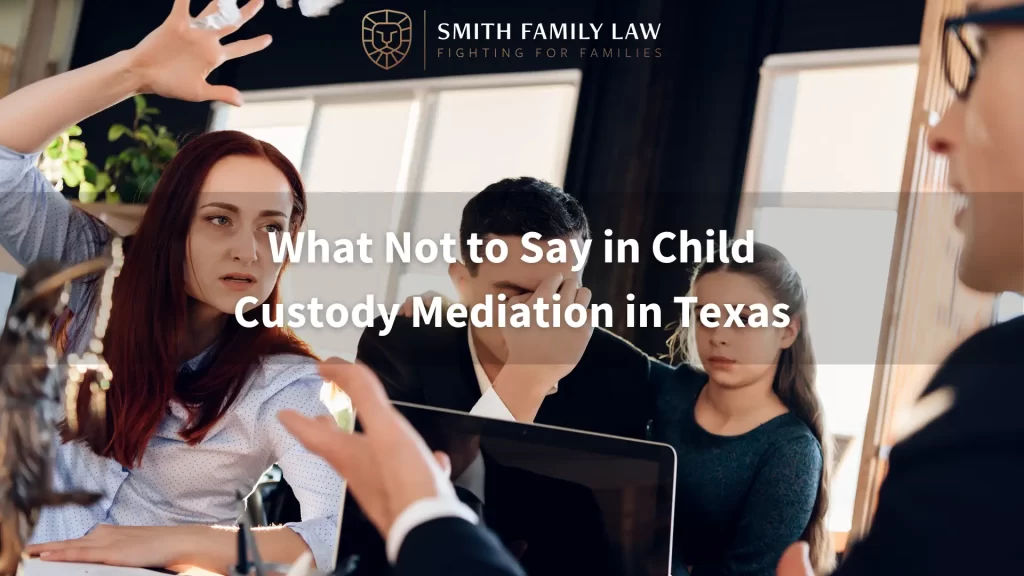Many divorce and child custody cases are settled out of court in structured mediation. When emotions are running high, and it’s difficult to reach an agreement about a workable parenting plan, child custody mediation may be the best opportunity for you and your child’s other parent to find a custody agreement that works.
A professional mediator oversees the mediation process. Often, each parent is kept in a separate room. The mediator brings proposals back and forth between the parties involved, striving for a compromise both parents can live with.
Sometimes, custody arrangements may take multiple mediation sessions, especially if there are significant custody disputes. Your family law attorney can represent you, offer guidance, and help you prioritize your concerns during the process.
Each case is unique, and your lawyer will likely caution you against saying specific things that might incite your ex-partner. Today, we’re offering you a primer on what not to say in child custody mediation and how to proceed.
Don’t Go into Mediation Without a Plan
Preparation for mediation is crucial. In mediation, the parents work through the contentious issues of a parenting plan and try to find opportunities for compromise. Although you may have an idea of what you want your child custody time to look like post-divorce, it’s rare to get everything you want in mediation.
You can prepare by identifying which items you are unwilling to compromise on (for example, you may wish to have primary custody or want to keep your kids in the same schools) and things you’re willing to compromise on (letting your ex have longer vacation time in the summer, or first dibs for custody during school holidays). You can yield these in exchange for what you truly want.
Don’t Be Disrespectful
A child custody case can be contentious, and while you may feel like your spouse is a jerk, you’re not going to get very far in mediation by calling them a jerk – or being disrespectful in any other way. Mind your language and try to refrain from angry outbursts. Your attorney may detect when your ex is unreasonable and can help redirect the conversation.
Don’t Go into a Place of Blame
Your mediation session isn’t a time for accusations over who is at fault for the ending of the relationship. Stay focused: you’re there to discuss child custody issues and parenting time, not who did what in your marriage.
First, you’re paying the mediator (and probably your attorney) by the hour, so your costs can add up quickly. Second, if you start an argument about the breakdown of your relationship, you’ll likely put your ex’s back up, and they’ll be less willing to compromise.
Don’t Make Ultimatums
Just like playing the Blame Game, making ultimatums can only serve to go against your best interests and the interests of your child or children. Don’t make threats or say that you will never yield on certain matters. Unless you are completely prepared to keep the ultimatum, you shouldn’t make unilateral threats.
Additionally, if mediation falls apart and your custody case goes to trial, then the judge is the one who will establish the parenting plan, and they typically consider the best interests of the child, not the ultimatum you made.
Don’t Demand More Money
Maybe you’ve worked out spousal support, or maybe you’ve received temporary orders for child support from a judge. You might be unhappy with your current monthly support and wish to discuss raising child support during mediation. This isn’t really the time or place to bring up getting more money.
Texas law establishes a specific formula to determine child support for the noncustodial parent to pay to the custodial parent. Your child support agreement could also include specific expenses one parent will pay, such as school fees, sports equipment, or private lessons for your child’s activities. These are not matters you should bring up in a mediation about child custody.
Don’t Say You Don’t Need Your Lawyer Present
Your family law attorney is your advocate and is there to help you. Don’t go through mediation without an attorney to guide you and represent your interests. A family law attorney can tell you what you can realistically expect from mediation or from a judge (if you can’t agree on a plan in mediation and your case goes to trial) and help you find an agreement you can live with.
Mediation is an emotional time. A lawyer can help you remain calm and focused on acting in your child’s best interests. Your ex may not have read these tips for what not to say in mediation, and they may try to get a rise out of you. Trust your lawyer to help you work through your issues and create a workable parenting plan.
Don’t Forget Why You’re There

Assess each aspect of the parenting plan objectively, considering if it benefits your child. If you and your child’s other parent cannot come to an agreement about a parenting plan in your child’s best interests, then you effectively give up your agency to choose how you want your custody decree to look. Many people find it better to compromise in mediation than take a chance in court.
Do You Need a Lawyer for Child Custody Mediation in Texas?
While legal representation isn’t mandatory in child custody mediation, having an attorney can enhance your chances of success. First, a family law attorney, like those at Smith & Bledsoe Family Law, knows Texas family law statutes very well and can help you keep a realistic idea of what you can and can’t get in mediation. Next, an attorney can keep you focused on what’s most important to you and offer suggestions to help you make compromises to achieve a custody arrangement you can live with.
If you are going through a divorce or have been asked to attend mediation to settle custody issues, we can help. Contact the team at Smith & Bledsoe Family Law today by calling (512) 277-3166 for a consultation with a compassionate, skilled Texas family law attorney.
Related Reading:
- What to Expect In Divorce Mediation In Texas
- Navigating Long Distance Co-Parenting And Custody Arrangements
- When Can a Child Decide Which Parent to Live with in Texas?
